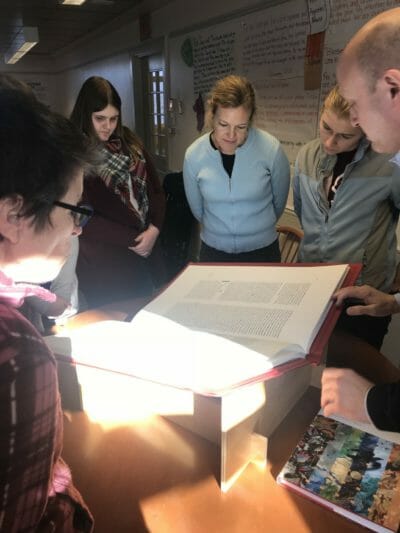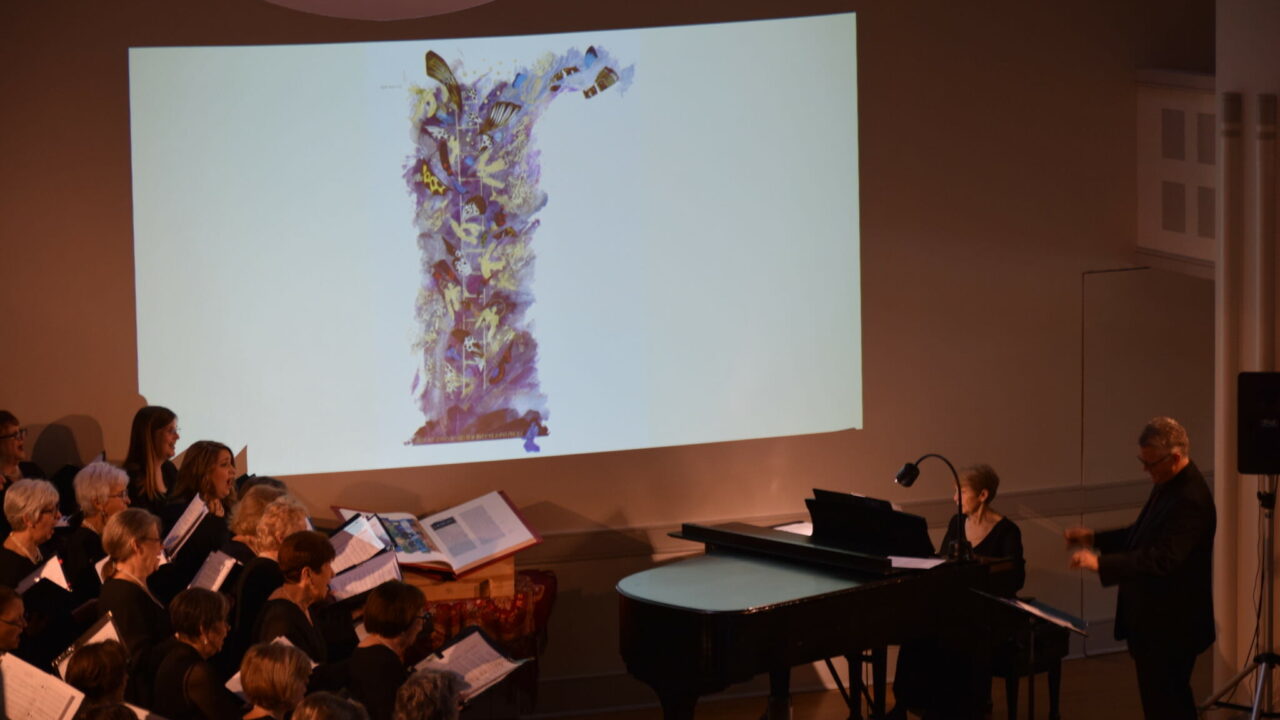“An Intellectually, Aesthetically and Spiritually Renewing Experience”: How the Heritage Edition Impacted Illinois Wesleyan University
IWU used The Saint John’s Bible as an “entry point” for meaningful discussion with a diverse student body
Among the defining characteristics of liberal arts colleges are encouragement of philosophical discussions and dialog with people of other worldviews. At Illinois Wesleyan University in Bloomington, Illinois, Rev. Elyse Nelson Winger has a special tool in her arsenal to nurture this atmosphere: a Multifaith Fund designated “to build programming that meets the needs of the chapel’s mission: to be a center for multifaith dialogue, service, and engagement.” In 2018, IWU made use of this valuable resource to participate in a Year With The Saint John’s Bible.
“I had been introduced to The Saint John’s Bible years ago when it first came out, and I had a couple of the coffee table books,” said Nelson Winger, the university chaplain. “I personally loved it.” An additional seed for the university’s participation was planted after a May 2014 showing at IWU during Augustana College’s joint year program with St. Mary Monastery of Rock Island. Following that, Nelson Winger said, “We explored the possibility for a couple of years until the timing was finally right” for the university to invest in A Year With The Saint John’s Bible.
Using Interfaith Resources to Bring Diverse Communities Together
Evelyn Chapel’s Multifaith Fund exists to encourage engagement not just regardless of faith tradition, but specifically to enhance learning opportunities with people of different worldviews. “That fund has been used to support things like A Year With The Saint John’s Bible, student experiences, alternative break trips and more. It’s been an amazing resource to be able to actually enact the vision for helping to make Evelyn Chapel a vital place for multifaith community,” Nelson Winger said.
“[IWU has] always had a strong commitment to supporting the spiritual lives of students, broadly speaking,” she continued. In addition to both Roman Catholic and Protestant Christians, its population includes students, faculty and staff from Muslim, Jewish, Bahá’í, Buddhist, Hindu and atheist backgrounds, among others.
Some of those engagement opportunities included an event in IWU’s Religion, Music and the Humanities series (featuring a presentation from Illuminating Justice author Jonathan Homrighausen, choral works hand-selected by Illinois State University’s Tim Fredstrom, and projected illuminations) and more than 30 different events at 20-some churches and community gatherings.
Under a small team led by Nelson Winger and Madeleine Callahan, a community liaison for The Saint John’s Bible, IWU put more than a few miles on the Heritage Edition. “We took it all over,” Nelson Winger said, including presentations at a local synagogue, Advocate BroMenn Medical Center, and the quarterly gathering of the Society for Creative Anachronism’s Central Illinois branch.
That group is made up of enthusiasts for the arts and skills of pre-17th-century Europe, among them “amateur artists who love calligraphy and were familiar with manuscript tradition,” Nelson Winger said. “They loved seeing the Bible and brought to it a calligrapher’s eye. They were astounded by the artistry” amid their Renaissance revelry.
 An “Entry Point” for Intellectual and Spiritual Dialogue
An “Entry Point” for Intellectual and Spiritual Dialogue
“[The Saint John’s Bible] allows for many different entry points,” Nelson Winger said, exemplified by the diversity of settings in which it was received in the Bloomington area. “For many secular students, it’s a different way to think about this ancient and sacred text.”
Nelson Winger is very conscious of IWU’s responsibility to encourage diversity of thought and spark meaningful discourse around the ways in which worldviews can differ – sometimes dramatically within a small space. “It was a way for us to share the resources of Illinois Wesleyan, but also to open up this wonderful conversation,” she said. “It was a great tool for community engagement and to welcome community members into these conversations around theology, art, hospitality, social justice, and inter-religious dialogue.”
The ability to reach just about anyone – students or locals, devout or searching – was the primary driver of IWU’s Heritage Edition programming. “I saw that embedded in the pages of The Saint John’s Bible,” Nelson Winger said. “Its intentional theological and artistic commitment to living out shared stories and shared values across religious traditions, from Psalms to the Frontispiece of the Gospel of Matthew, is extremely powerful. I felt that the vision of [The Saint John’s Bible] to be a Bible for our time, to create new kinds of conversations around inter-faith dialogue, was in sync with the values of the chapel and the university as a whole.
“For people who interacted with it, both on campus and in the community, it was an intellectually, aesthetically, and spiritually renewing experience,” she said. “No matter what their relationship was to it personally or intellectually, it was offered in such an innovative and fresh way, but also rooted in tradition. [The Saint John’s Bible] opened up conversations about the Bible and its message in a way that nothing else can.”


